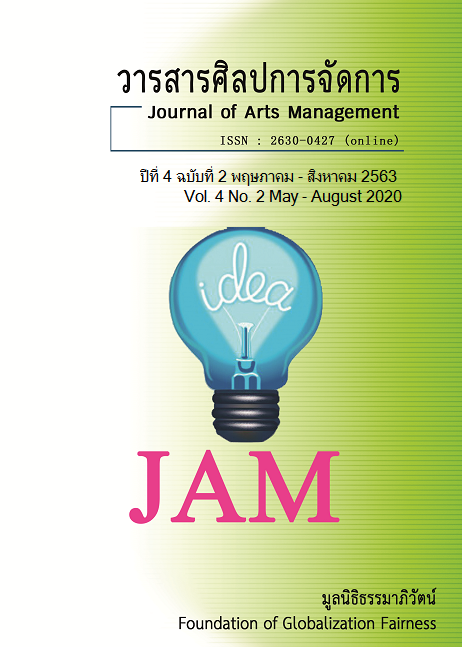The Intelligence Affair Management of School Administrators
Main Article Content
Abstract
The purposes of this research were: 1) to identify the factors of the intelligence affairs management of school administrators, and 2) to verify the factors of the intelligence affairs management of school administrators. The population were 28,358 primary schools under the Primary Educational Service Area Office under the Office of the Basic Education Commission. The sample size of 97 was determined by Taro Yamane sample size table at the confidence level of 90%. The three respondents from each school consisted of school director, deputy school director and school committee (teacher representative), with the total of 291. The research Instruments used to collect the data were semi-structured interview, opinionnaire, and questionnaire. The statistics for data analysis were frequency, percentage, arithmetic mean, standard deviation, exploratory factor analysis, and content analysis.
The findings were as follows:
- The intelligence affairs management of school administrators consisted of 5 components: 1) intelligence preparing with 25 variables; 2) intelligence assembling with 19 variables; 3) intelligence operating with 16 variables; 4) decision-making with 10 variables; 5) monitoring, evaluation, and reporting with 9 variables.
- The factors of the intelligence affairs management of school administrators were verified to meet with accuracy standards, propriety standards, feasibility standards and utility standards.
Article Details
Views and opinions appearing in articles in the Journal of Arts of Management It is the responsibility of the author of the article. and does not constitute the view and responsibility of the editorial team I agree that the article is copyright of the Arts and Management Journal.
References
กมนทรรศน์ พึ่งถนอม. (2554). การวิเคราะห์การบริหารจัดการด้านข้อมูลข่าวสารขององค์การบริหารส่วนตำบลมหาสวัสดิ์ในอำเภอพุทธมณฑล จังหวัดนครปฐม. วิทยานิพนธ์ปริญญามหาบัณฑิต สาขาวิชาวิทยาการจัดการ, มหาวิทยาลัยมหิดล.
กระทรวงศึกษาธิการ. (2558). นโยบายรัฐมนตรีว่าการกระทรวงศึกษาธิการ. สำนักงานปลัดกระทรวง: กระทรวงศึกษาธิการ.
________. (2562). ประกาศกระทรวงศึกษาธิการ เรื่อง นโยบายและจุดเน้นการจัดการศึกษาของกระทรวงศึกษาธิการ ปีงบประมาณ 2562.
________. (2563). นโยบายกระทรวงศึกษาธิการ. เข้าถึงได้จาก http://www.moe. go.th/
กิตติ สินสวัสดิ์. (2560). การใช้วงรอบข่าวกรองในการแกไขปัญหายาเสพติดภายในค่ายพักของกรมการ ทหารช่าง. เอกสารวิจัยส่วนบุคคล, วิทยาลัยการทัพบก.
ฉัตรพงศ์ ฉัตราคม. (2551). ยุทธศาสตร์การผลิตข่าวกรองจากอหล่งข่าวเปิด. วิจัยส่วนบุคคล หลักสูตรการป้องกันราชอาณาจักร, วิทยาลัยป้องกันราชอาณาจักร.
พจน์ ใจชาญสุขกิจ, (2563.). การปฏิบัติการสารสนเทศและการบริหารข้อมูลข่าวสารเพื่อรับมือต่อการเปลี่ยนแปลงท่ามกลางสงครามการสื่อสารในยุคดิจิทัล. วารสารวิชาการศรีปทุมชลบุรี, 16(3), 11.
“พระราชบัญญัติการศึกษาแห่งชาติ พุทธศักราช 2542.” ราชกิจจานุเบกษา เล่ม 116, ตอนที่ 74 ก (19 สิงหาคม 2542): 1.
ยุคลธร บริสุทธิ์. (2553). กระบวนการหาข่าวของนักข่าวสังกัดสถานีโทรทัศน์โมเดิร์นไนน์ กรณีเหตุการณ์ความไม่สงบในพื้นที่ 3 จังหวัดชายแดนภาคใต้ ประเทศไทย. ปริญญาศิลปศาสตร์ มหาบัณฑิต สาขาวิชาการจัดการภาครัฐและภาคเอกชน บัณฑิตวิทยาลัย มหาวิทยาลัยศิลปากร.
วิทยา เกริกศุกลวาณิชย์. (2557). กระบวนการเชิงระบบในการกำกับติดตามการดำเนินงานตามนโยบายของโรงเรียนมัธยมศึกษา. ปริญญาปรัชญาดุษฎีบัณฑิต สาขาการบริหารการศึกษา ภาควิชา การบริหารการศึกษา บัณฑิตวิทยาลัย มหาวิทยาลัยศิลปากร.
สรรเสริญ คล้ายแก้ว. (ม.ป.ป.). การข่าวกรอง. เอกสารประกอบการบรรยายรายวิชาการดำเนินงานของฝ่ายอำนวยการ กรมยุทธศึกษาทหารบก โรงเรียนเสนาธิการทหารบก.
สำนักงานเลขาธิการสภาการศึกษา. (2562). ยุทธศาสตร์. เข้าถึงได้จาก http:// www.onec.go.th/ index.php//page/Viewall/Newseducation
Cronbach, L. J. (1984). Essentials of Psychological Testing (4th ed.). New York: Harper & Row.
Steele, R.D. (2002). The New Craft of Intelligence. Virginia: OSS International Press, Oakton.
Yamane, T. (1967). Statistic: An Introductory Analysis. New York: Harper and Row.


